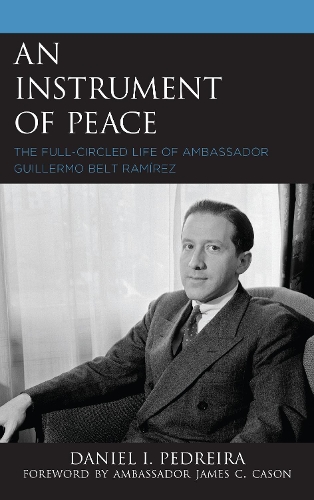
An Instrument of Peace: The Full-Circled Life of Ambassador Guillermo Belt Ramrez
(Hardback)
Available Formats
Publishing Details
An Instrument of Peace: The Full-Circled Life of Ambassador Guillermo Belt Ramrez
By (Author) Daniel I. Pedreira
Foreword by Ambassador James C. Cason
Bloomsbury Publishing PLC
Lexington Books
13th June 2019
United States
Classifications
Professional and Scholarly
Non Fiction
Diplomacy
972.91063092
Physical Properties
Hardback
196
Width 160mm, Height 229mm, Spine 18mm
494g
Description
This book presents a meticulously-researched biography on Guillermo Belt Ramrez, one of Cubas most important diplomats of the 20th century. As Ambassador, Belt represented his homeland in the United States and the Soviet Union as the Cold War turned wartime allies into enemies. He also represented a generation of diplomats who, after bearing witness to the horrors of war, had the resolve to join to create the United Nations and regional organizations such as the Organization of American States. Belts success in the diplomatic and political spheres were met with the pain and hardship of exile. Thanks to his faith, the love of his family, and an unwavering sense of patriotism, Belt persevered, maintaining his passion for Cubas democratic values and ideals until his passing. In doing so, he became a respected and sought after voice for Cuban exiles in Washingtons diplomatic and government circles. This book explores several key questions: Who was Guillermo Belt and what role did he play in Cuban politics and diplomacy What was Cubas role in world affairs during and after World War II How does Cubas diplomatic history help explain current U.S.-Cuban relations within a broader political and historical context as reflected by Ambassador Belts life
Reviews
A much deserved recognition to one of Cubas most distinguished diplomats. Well researched and detailed, this book provides a warm yet unapologetic portrayal of Guillermo Belt and his times. -- Luis G. Sols, Florida International University
A carefully researched account of Guillermo Belt and his impact on Cuba diplomacy. Well written and comprehensive, this book sheds light on and makes a significant contribution to the understanding of an important and little researched period of Cuban history. -- Jaime Suchlicki, professor emeritus and director, Cuban Studies Institute
In presenting the life of Guillermo Belt, Daniel Pedreira has done a great service to Cuban, and indeed Latin American History, and taken an important step in dismounting the Castro Dictatorships effort to conceal and rewrite the past. Belt was part of a remarkable cadre of Cuban diplomats who served their country with honor and distinction during turbulent times both in Cuba and the World, since Independence in 1902 until the advent of Tyranny, in 1959. Furthermore, Belts career in exile highlights his sense of duty and commitment to his country and to future generations of Cubans. I enthusiastically recommend "An Instrument of Peace" . It is required reading for anyone interested in understanding the true history of Cuba and what the future may hold the day that the country has again joined the ranks of democratic societies. -- Aurelio Fernandez-Concheso M., author of "El Diplomatico- de la Gran Depresin a la Guerra Fra"
Even in the darkest of times, wrote Hannah Arendt in the preface of one her books, "we have the right to expect some illumination", and "such illumination may well come less from theories and concepts than from the uncertain, flickering and often weak light that some men and women, in their lives and their works, will kindle under almost all circumstances and shed over the time span that was given them on earth...." There is a number of courageous individuals in the Cuban history of the 20th century, whose life story is endowed with such a illuminating power and Ambassador Guillermo Belt is undoubtedly one of them. This book is essential reading for anyone who wants to eliminate once for all the adversarial effects of Orwellian memory hole created by the six decades of communist rule imposed on Cuba by Fidel Castro and work for the rebirth of Cuban political nation free and prosperous, capable to rediscover and assess critically its past and find its proper place in the todays world, alongside with other Latin American liberal democracies, within the family of nations struggling together against all totalitarian tendencies the global humanity is exposed to in the first decades of the 21st century. -- Martin Palous, Florida International University
Author Bio
Daniel I. Pedreira is author of The Last Delegate: The Political Development of Emilio Millo Ochoa
